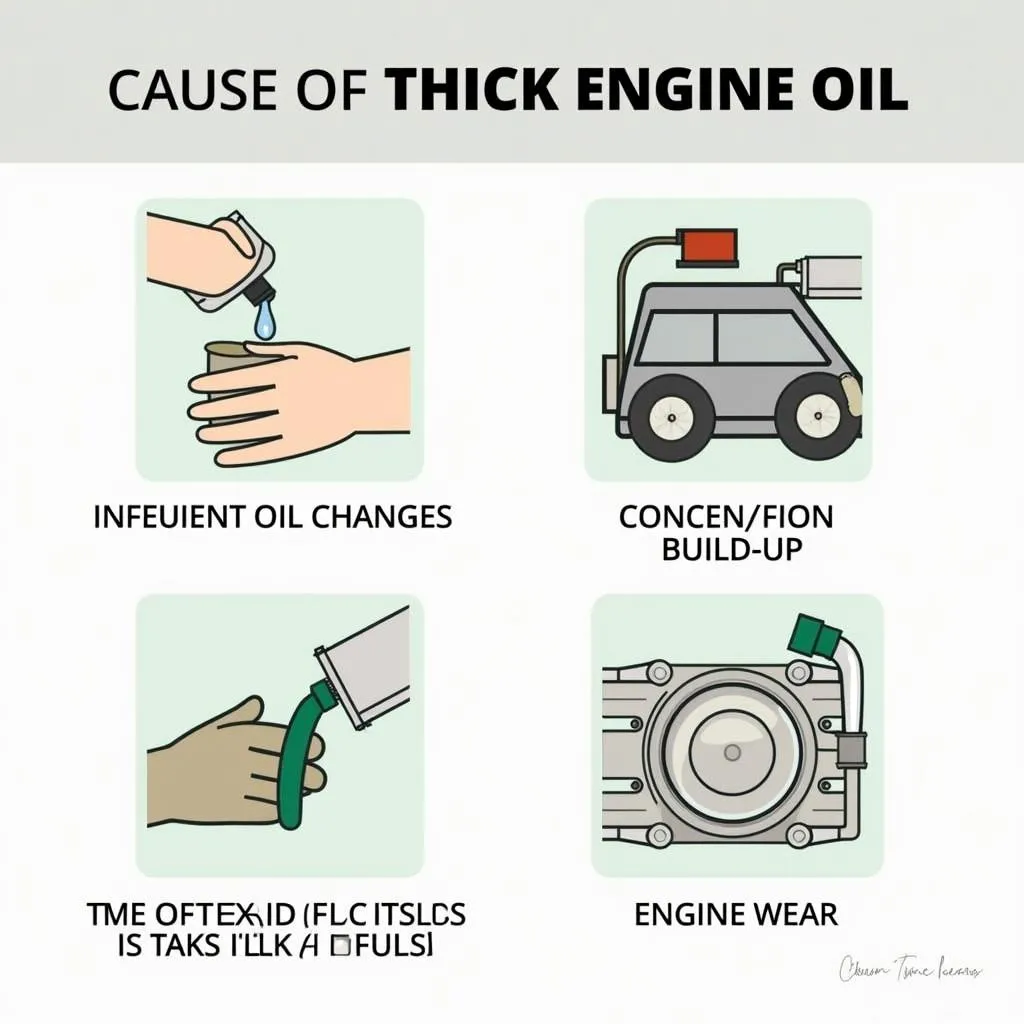When the engine is cold and you check the dipstick, the engine oil should be thin and clear. But what if the oil appears thick? “Thick engine oil” is a warning sign that car owners should take seriously.  Close-up of thick engine oil on dipstick showing potential causes It can indicate various problems that can impair engine performance and lead to costly repairs.
Close-up of thick engine oil on dipstick showing potential causes It can indicate various problems that can impair engine performance and lead to costly repairs.
What Does Thick Engine Oil Mean?
Engine oil is the lifeblood of every engine. It lubricates the moving parts, reduces friction, and prevents excessive wear. Over time and through constant use, however, engine oil can change its viscosity and become thick. This phenomenon can have various causes.
Causes of Thick Engine Oil
- Contamination: One of the most common causes of thick engine oil is contamination. This includes dust, dirt, fuel residues, and metal abrasion. These particles mix with the oil and make it more viscous.
- Condensation: Especially during short trips, condensation can form in the engine. This water mixes with the oil and also leads to thickening.
- Infrequent Oil Changes: Regular oil changes are crucial for the life of the engine. If the oil is not changed in time, it loses its lubricating properties and becomes thick.
- Engine Overheating: Severe engine overheating can cause the engine oil to burn and clump. This also manifests as a thick consistency.
- Defective Cylinder Head Gasket: A defective cylinder head gasket can allow coolant to enter the oil circuit. The mixture of oil and coolant is significantly thicker than pure oil.
Risks of Thick Engine Oil
Thick engine oil can put a heavy strain on the engine and lead to various problems:
- Increased Engine Wear: The thick consistency makes it difficult for the oil to circulate in the engine. The result is inadequate lubrication of the moving parts, leading to increased wear and friction.
- Reduced Engine Performance: Viscous oil can prevent the engine from reaching its full performance.
- Increased Fuel Consumption: The increased friction in the engine due to poor lubrication leads to higher fuel consumption.
 Engine components coated with thick, viscous engine oil
Engine components coated with thick, viscous engine oil - Engine Damage: In the worst case, thick engine oil can lead to engine damage.
Solutions for Thick Engine Oil
The solution to the problem depends on the underlying cause. In some cases, a simple oil change with high-quality engine oil is sufficient. In other cases, however, more extensive repairs may be necessary.
- Regular Oil Changes: Adhere to the oil change intervals recommended by the vehicle manufacturer.
- Use High-Quality Engine Oil: High-quality oils contain additives that keep the viscosity of the oil stable even at high temperatures.
- Check the Engine Regularly: Pay attention to signs of oil leaks, coolant loss, or unusual engine noises.
Thick Engine Oil: A Case Example
Imagine: Mr. Miller, a family man, notices that his engine is running unusually loud when cold. When he checks the dipstick, he finds that the oil is thick and dark. Mr. Miller remembers that his last oil change was a long time ago. In this case, the solution is relatively simple: an oil change with a high-quality oil will most likely solve the problem.
Conclusion
Thick engine oil is a warning sign that should be taken seriously. Through regular maintenance and checking of the engine oil, you can extend the life of your engine and avoid costly repairs.  Mechanic performing a regular oil change on a car If you have any uncertainties or further questions on the subject, please do not hesitate to contact us. We at AutoRepairAid.com are happy to assist you with our expertise!
Mechanic performing a regular oil change on a car If you have any uncertainties or further questions on the subject, please do not hesitate to contact us. We at AutoRepairAid.com are happy to assist you with our expertise!

